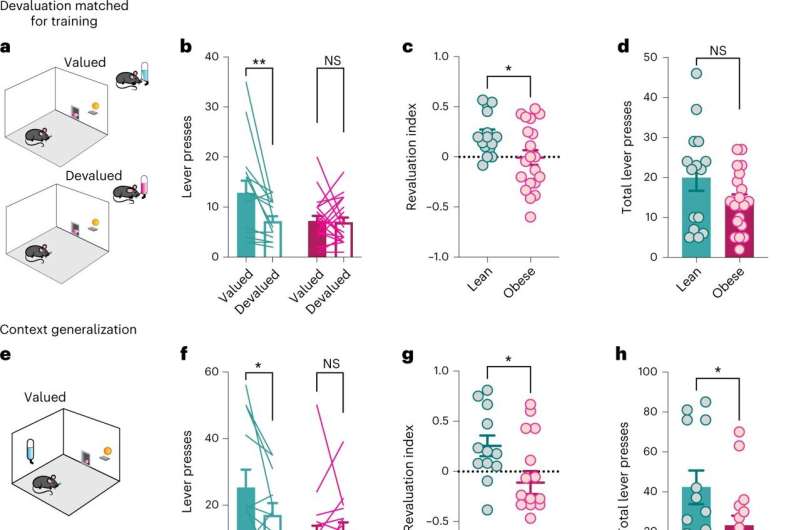Researchers discover that a change in brain function contributes to obesity


University of Calgary researchers find diet-induced obesity is linked to a functional change in the brain. The study published in Nature Neuroscience finds that in obese mice there is a reduction in function of the brain’s brake signal located in the lateral orbitofrontal cortex. This region of the brain is involved in decision making about rewards and whether action should be taken to get rewards.
“We all change how we value food,” says Dr. Stephanie Borgland, Ph.D., professor at the Cumming School of Medicine and senior author on the study. “For example, when you’re hungry, a chocolate bar is a high value food. If you were forced to eat five or six chocolate bars though, you would become averse to it. This process is called devaluation.”
Researchers have long known that the brain is integral to controlling decisions about eating, but only now have they identified the specific part of the brain involved in devaluing food changes as obesity develops. Using mice, the Borgland lab adapted three devaluation methods commonly used to examine changes in goal-directed behavior in obese mice.
“We discovered that if we essentially turned off the brake signal in the lateral orbitofrontal cortex, then our lean mice continued to work for sucrose even though they just consumed enough to be fully sated,” says Dr. Lauren Seabrook, Ph.D. candidate and the lead investigator of this study, “When we restored normal activity in the orbitofrontal cortex of obese mice, mice regained the ability to devalue the sucrose and control over eating habits.”
Approximately one in four Canadian adults (26.6 percent) are currently living with obesity. Diet-induced obesity, along with metabolic disease, is a major health concern and is associated with multiple diseases including type 2 diabetes, stroke, cancer and depression.
“Our research is confirming that overeating has nothing to do with personal responsibility. It has to do with changes in the way the brain works in response to our food environment,” says Borgland. “There is so much stigma with obesity. You would never hear anyone stigmatizing someone with a brain change due to Multiple Sclerosis or Parkinson’s. Why are we doing it with obesity?”
More information:
Lauren T. Seabrook et al, Disinhibition of the orbitofrontal cortex biases decision-making in obesity, Nature Neuroscience (2022). DOI: 10.1038/s41593-022-01210-6
Journal information:
Nature Neuroscience
Source: Read Full Article